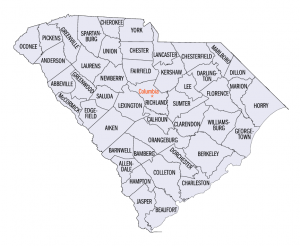
By Lindsay Street, Statehouse correspondent | A Trump administration official praised South Carolina this week for its continued response to the opioid crisis.
“I was impressed with what’s going on with South Carolina,” said Vanila Mathur Singh, chief medical officer of the U.S. Department of Health and Human Services. Singh made the remark Tuesday during a S.C. House Opioid Abuse Prevention Study Committee meeting.

But people are still dying by the hundreds in South Carolina, according to the state. During that same meeting, S.C. Department of Alcohol and Drug Abuse Services head Sara Goldsby said that while the state has made strides in its response, work remains.
“We have been addressing it very well, but the reality is we are in a drug crisis, we are in an addiction crisis, and we can’t lose sight of our emerging threats,” she said.
And while there have been nearly 20 new opioid-related laws since 2017, lawmakers are eyeing more action in 2020.
The current crisis
In 2017, South Carolina had 748 opioid-related overdose deaths.
“We expect those numbers will continue to climb and not yet levelling off or going down,” Goldsby said. “Those are more than numbers; those are people who we care about.”
But there may be good news on the horizon, in contrast to Goldsby’s forecast. Preliminary national numbers from 2018 appear to show overdose deaths are declining nationwide for the first time since the 1990s.
About 20 states, including South Carolina, could see a decrease in overdose deaths. According to the early data from the Centers for Disease Control, South Carolina is expected to see a 5.2 percent decline in overdose deaths from 2017 to 2018.

“We know we’ve got a crisis. Despite what the numbers say, it’s still something affecting too many people,” S.C. Rep. Marvin Pendarvis, D-Charleston, said. Pendarvis serves on the House Opioid Abuse Prevention Study Committee.
Goldsby did not respond to multiple requests seeking comment. During her Tuesday presentation, she noted several encouraging signs in the state:
- So far in 2019, 12,000 pounds of prescription drugs have been dropped off with law enforcement as part of take-back programs;
- There have been 861 administrations of a drug that reverses the effects of drug overdose with more than 40 community distributors;
- Those in medication-assisted treatment have increased to 3,428 this year, up from 2,221 in 2018; and,
- There are more than 300,000 known South Carolinians in recovery.
Legislators at work
According to Goldsby’s Tuesday presentation, a 2017 law that requires practitioners to check a database before prescribing an opioid is working. In her presentation, she reported that prior to the bill being passed there were a half million queries into the database. This past May, there were 2.6 million for that month alone.
In 2018, legislators passed even more, including:
- A law requiring informed consent prior to prescribing opioid medication to minors (H. 3819);
- An act requiring prescriptions for controlled substances to be written on tamper-resistant prescription pads (H. 3826);
- A law making technical adjustments and revisions related to the scheduling of controlled substances (H. 4487);
- Authorization for DHEC’s Bureau of Drug Control to provide data in the prescription monitoring program to county coroners and medical examiners (H. 4488); and,
- A law establishing the definition of a “community distributor” as any public or private organization that provides services and assistance in relation to substance use disorder (H. 4600).
This past year, legislators passed two measures related to the opioid crisis:
- A law requiring health care facilities to submit certain information to the Department of Health and Environmental Control (DHEC) for inclusion in the Prescription Monitoring Program when a person is administered an opioid antidote (H. 3728); and,
- A law requiring veterinarians to complete continuing education on controlled substance prescriptions and monitoring (H. 3732).
The chair of the House committee who has spearheaded most of the legislation, S.C. Rep. Russell Fry, R-Horry, did not respond to multiple attempts for comment for this story.
Litigation in the works
One step in the opioid crisis has been litigation as public entities seek to cover costs of addiction.
Forty-five states, including South Carolina, and many counties and municipalities around the nation are suing pharmaceutical companies. There are more than 1,000 lawsuits pending, according to Regina LaBelle, director of Addiction & Public Policy Initiative at Georgetown University.
“There really is a groundswell of all these cases,” she told Statehouse Report. “States and localities are really overwhelmed with the amount of money they’ve had to payout in face of the mounting overdose deaths in their local communities.”
The S.C. Attorney General’s Office filed a lawsuit in 2017 against Purdue Pharma, an opioid drug maker. The lawsuit alleges the company created a public nuisance for unjust enrichment. The trial is expected for the latter half of 2020, according to the office.
 At least 42 of the state’s 46 counties have also filed two separate lawsuits, also against Purdue. A state-level lawsuit has consolidated the complaints from 38 counties, and a federal lawsuit, based in Ohio, includes municipalities and counties from around the country.
At least 42 of the state’s 46 counties have also filed two separate lawsuits, also against Purdue. A state-level lawsuit has consolidated the complaints from 38 counties, and a federal lawsuit, based in Ohio, includes municipalities and counties from around the country.
The counties in the federal suit are Newberry, Berkeley, Richland and Georgetown.
Purdue Pharma has denied any wrongdoing, according to multiple media reports.
The only counties that are not signed on to either the state-level or federal-level lawsuits are: Charleston, Chester, Marlboro and Darlington, according to a statewide search of cases that have been filed.
“We continue to weigh our options,” Charleston County public information officer Shawn Smetana said via text message.
But, LaBelle said, litigation is a limited response.
“That’s closing the door after the horse has left the barn in some ways,” she said. “This is one piece. There’s validity to bringing these cases but … we shouldn’t kid ourselves into thinking this is going to solve all our problems.”
What’s needed in 2020
One item awaiting senators in 2020 will be a House opioid-related bill that would make it a trafficking offense for a person to be in possession of four grams or more of the powerful and deadly opioid fentanyl. Just 2 milligrams of fentanyl can kill the average person. The bill is currently in the Senate Judiciary Committee.
Pendarvis said the House Opioid Abuse Prevention Study Committee, which has brought many of the opioid bills forward including the fentanyl trafficking bill, is working on two fronts.
“One is ensuring we get the drugs off the streets and, two, we get the proper treatment for the people going through this,” he said, adding that the committee is working on comprehensive legislation.
- The third annual S.C. Governor’s Opioid Summit is slated for Sept. 5-6 in Columbia. Learn more here.
Goldsby said her agency is working toward making recovery housing more available and offering grants for recovery organizations. She also said county-level strategies for medication-assisted treatment will be developed over the next year.
LaBelle, the national expert in state opioid policy, cited several states making strides: Rhode Island has implemented medication-assisted treatments at its correctional facilities; New Hampshire has created a recovery workforce program that destigmatizes addiction and helps with employment; and Kentucky has ramped up syringe exchanges and expanded access to medication-assisted treatment.
- Have a comment? Send to: feedback@statehousereport.com



Pingback: Charleston Currents – 7/22: Magnolia workshop; Stupid meeting; SCPA growth